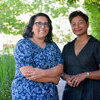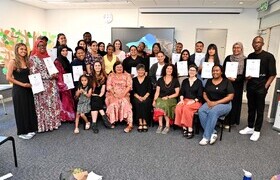What indigenous health services mean for students
25 November 2025 | Story Kamva Somdyala. Photo Ruairi Abrahams. Read time 4 min.
The University of Cape Town’s (UCT) Student Wellness Service (SWS) is currently implementing a three-year pilot that incorporates indigenous health advisory services into their holistic care model.
This is according to director of SWS, Dr Memory Muturiki. The service is delivered by Dr Christie van Zyl, a registered traditional health practitioner (THP), who provides psychospiritual counselling, support for students undergoing rites of passage, a culturally grounded support group; and motivation for academic concessions where clinically indicated.
“Our collaboration with Dr van Zyl began in 2019. The UCT Student Mental Health Policy recognises medical certificates from registered THPs, and SWS offers this on-campus access because many students study far from home and their traditional support systems,” said Dr Muturiki.
“The pilot was established in response to clear demand from students who engaged with our crisis intervention service seeking culturally aligned support. To date, over 40 students make regular use of the service, with many more having benefitted during their broader student success journeys. This consistent utilisation reflects high levels of trust and perceived value.”
“We have not experienced significant challenges integrating the service, largely because it is fully student-centred.”
This is all part of SWS’s commitment to delivering transformative, holistic, and accessible primary healthcare that evolves with the changing needs of students. Furthermore, it includes expanding access pathways, embracing innovative care modalities, and designing services that meet both the expectations and lived realities of students.
For starters, how does SWS define indigenous health? According to Muturiki, they have adopted the Department of Health’s terminology. “These practitioners are formally recognised and registered through the Traditional Health Council, the national regulatory body. In practice, this means that indigenous healing is implemented within a regulated framework that ensures safety, professionalism, and appropriate integration with mainstream health services,” said Muturiki.
Benchmarking
“From a wellness point of view, the greatest opportunity lies in strengthening collaborative and holistic care for our students. THP’s frequently refer students to medical or counselling services that they may not have sought. This bidirectional collaboration enhances early detection, improves continuity of care, and fosters an inclusive wellness environment where diverse healing traditions are acknowledged and respected.
“We have not experienced significant challenges integrating the service, largely because it is fully student-centred and incorporated into our SWS counselling booking platform. From a sustainability perspective, the pilot continues to be supported and endorsed by the executive director of the Department of Student Affairs (DSA), Pura Mgolombane; and Deputy Vice-Chancellor (DVC) for Transformation, Student Affairs and Social Responsiveness Professor Elelwani Ramugondo.”
Muturiki added: “We are already engaging with several universities provincially and nationally who have approached us for benchmarking and knowledge exchange. Our model is generating interest as a practical example of integrating indigenous health within a higher education environment, and we continue to share insights through professional networks such as the Worldwide Universities Network (WUN) and national student-support platforms. The results of the pilot will be broadly shared at the upcoming WUN Global Mental Health Symposium to be hosted in June 2026 at UCT.”
 This work is licensed under a Creative Commons Attribution-NoDerivatives 4.0 International License.
This work is licensed under a Creative Commons Attribution-NoDerivatives 4.0 International License.
Please view the republishing articles page for more information.










